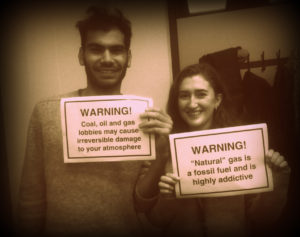 This week COP24, the UN climate change conference, kicked off in Katowice, Poland. Ahead of the COP, activities took place in various countries to show the peoples’ demand for truly ambitious climate talks and against false solutions. Brussels saw what is most likely its largest climate march in history on 2 December and thousands of Australian students went on strike over their government’s inaction on climate change.
This week COP24, the UN climate change conference, kicked off in Katowice, Poland. Ahead of the COP, activities took place in various countries to show the peoples’ demand for truly ambitious climate talks and against false solutions. Brussels saw what is most likely its largest climate march in history on 2 December and thousands of Australian students went on strike over their government’s inaction on climate change.
The COP host country and particularly the region around Katowice are heavily dependent on coal, and fossil fuel corporations are not only sponsoring the talks but also very visible throughout the conference. To showcase this blatant case of conflict of interest, public interest group Corporate Europe Observatory will organize a lobby tour around the COP24 location.
What else is happening around gas at the COP?
Despite strong corporate influence at the talks, clear statements will be made by civil society and anti-gas activists. In particular, watch out for the creative actions that Gastivists plan to make the issues around gas visible at the COP!
Are you in Katowice for the next few days? Join some of the events on gas:
- Thursday, 6th December, 10:30-12.00; Workshop: A Dangerous Distraction: so-called ‘renewable gas’; Location: Climate Hub
- Monday, 10th December, 18.30-20.00; GreenTalks: Just Energy Transition – Transforming lives and policies to stay below 1.5°C, going beyond growth and fossils; Location: Climate Hub
- Thursday, 13th December, 11.30-12.45; Panel Talk: 1.5 Can’t Handle a Coal to Gas Switch; Location: UNFCCC, Room 4
And for those who would like to see how the gas lobby tries to get its toxic message across at the COP you might like to visit this event organized by GasNaturally:
- Wednesday, 12th December, 16.30-18.00;Achieving a net zero emissions energy system by 2050; Location: EU Pavilion, Room Vienna
Which 2050 plans does the EU Commission bring to the COP?
The European Commission published its 2050 climate strategy before heading to the climate talks. It contains eight different pathways; five are leading to 80 to 90% of greenhouse gas emission reductions while the other three are (and this is very positive news) supposed to reach net zero emissions.
Scenario number eight, however, seems to be the most progressive one. It aims at reaching net zero emissions by 2050, combining all zero-carbon energies and energy efficiency, assuming a highly circular economy and less carbon-intense consumer choices.
The devil is, as usual, in the detail. All scenarios, even the likely most progressive eighth one, will still rely to a certain extent on gas. This includes, in differing amounts, so-called “renewable” or low carbon gases. That’s clearly bad news for the climate and casts doubt on the final greenhouse gas reduction potential of the proposed scenarios.
The scenarios are also big on bioenergy with carbon capture and storage (BECCS). Depending on the kind and amount of bioenergy in the energy mix, the generation of such sources of energy can have damning side effects, just as we saw in the unsuccessful attempts of introducing biofuels or the debate on “renewable gas”.
Another doubtful negative emissions technology that the scenarios rely on to reach emission reduction goals is carbon capture and storage (CCS). The idea of capturing CO2 and storing it, for example, underground, might one day contribute to a decrease in greenhouse gas emissions, but there are still high uncertainties whether this solution will be applicable on a larger scale one day.
Obviously, fossil fuel corporations love relying on these magic fixes to justify business as usual, but it is highly irresponsible to keep emitting CO2 while depending on complicated schemes that might have severe negative consequences. Meanwhile, if it even works, it might simply be too late.
Whats’ crucial, but not foreseen in the Commission strategy, is acting and starting to implement measures working toward a net zero future by 2050 now. We have little time left to avoid the worst impacts of climate change, and, as the International Energy Agency’s Executive Director put it: “We have no room to build anything that emits CO2 emissions.”
We know that all past COPs have not been ambitious enough, and we know that this year’s COP is crucial to work on the implementation of the Paris Agreement. A united, strong voice calling for a fossil fuel phase out is crucial to get the climate talks on track for a clean, liveable future.


